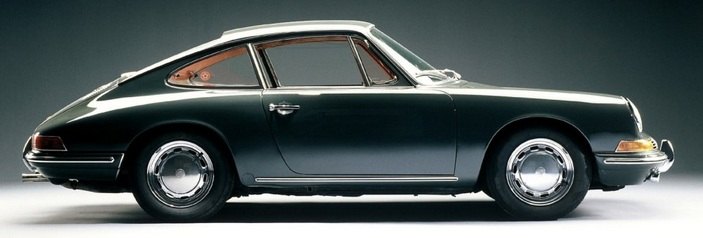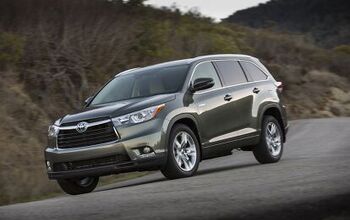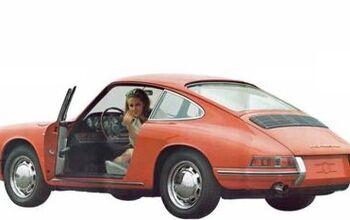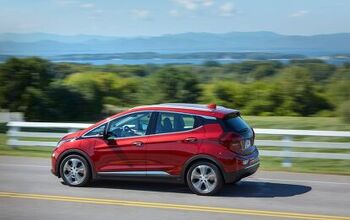Does The Porsche 911 Have Any Competitors?

I used to work for Porsche. You already know this because I mention it in most of my stories, hopeful that you will go tell your friends “TTAC has a guy who used to work for Porsche!” to which they will reply: “Used to? Road & Track has fifty people who still do.”
Just kidding. The cars get good reviews because they’re damn good. I know this because when I worked at Porsche I had several 911 company cars, and the ones I didn’t crash drove tremendously. This sentiment was not echoed by my rear seat passengers, who often said things like: “This is really cramped!” or “You want to give this up to be a blogger?”
When I worked there, I had two main questions on my mind at all times. Traditionally popular in the morning, the first one was: “Can I get away with a two-hour lunch today?” But when I got back from lunch around 2:30, the rest of the day was spent pondering the second one: “What the hell competes with the 911?”
A Brief History of 911
To help answer this question, let’s take a walk down 911 memory lane. Some of you are saying: “Yes! Porsche!” whereas others have already tuned out and are thinking: “I hope Steve Lang writes something today.”
For those in the second category (which includes my mother), I’ll be brief. Here’s a basic rundown of the 911. It came out in 1963 as a rear-engined sports car back when there was no such thing as a rear-engined sports car because that would be stupid. In other words, it was exactly like today.
Throughout the 1970s and 1980s, Porsche did things to make it even cooler. This included the “whale tail” spoiler, the Fuchs wheels (rhymes with “Lukes,” which I learned the hard way), and a turbocharged model that was famous for killing like OJ Simpson, and in a similarly violent manner.
But at some point between 1989 and 2013, Porsche ruined it, which can be confirmed by any purist who owns a 30-year-old 944 with fading paint. Unfortunately, purists can’t agree on exactly when this happened. Some will say the 1990 debut of Tiptronic. Others, the 1999 arrival of the water-cooled 996 with its ugly headlights. Further nominees include the 2003 Cayenne (which isn’t even really related to the 911) and the all-new GT3 which now comes solely with PDK.
Regardless of your view on when it happened, the simple fact is that the 911 is no longer the sports car it once was. Instead, it now lives in a blended world of sports car and grand tourer. So what exactly competes with it?
Potential Candidates
When I ask people this question, I get various answers, all said with tremendous confidence. I will now debunk each of them, using my favorite argument style: the one where I list things and describe why they’re right or wrong. These arguments are typically very solid in that they often stand, enshrined in perfection, until the very first comment.
Mercedes SL-Class: On paper, the SL-Class seems like a perfect competitor in the “overpriced grand tourer” segment. Similar performance numbers. Similar pricing. Similar old male buyers who cruise below the speed limit while looking around to see if anyone’s noticing them. But in practice, the SL’s vague steering and squishy ride means it doesn’t come close.
BMW 6-Series: The 6-Series is the reigning king of the “overpriced grand tourer” segment. It would be the perfect competitor, except for the fact that it weighs as much as a medium-sized Sheraton Gateway.
Chevrolet Corvette: The Corvette is actually a reasonable match in a lot of ways – and with every new iteration of the ‘Vette, driving experience is increasingly one of them. But the $50k Corvette isn’t cross-shopped with the 911, which costs $90k, or $2.4 million with options.
Nissan GT-R: The GT-R should be the ultimate 911 competitor. It costs as much as a Carrera S, but it has the performance of a Turbo. I’ve driven a GT-R, and it’s just as balanced as any Porsche, or Ferrari. It does have “soul.” But … it’s a Nissan. And no one grew up with posters of Nissans on their bedroom walls. Say what you will, but at $100k, brand value plays a role in your car decision.
In other words: the 911, a car that is largely responsible for making Porsche the most profitable automaker in the world, plays in a segment without competition.
Or Does It?
After much post-lunch deliberation, I’ve concluded that the 911 has just two competitors: the Boxster and the Cayman.
That’s right: Porsche’s own “baby” sports cars are the only legitimate challengers to the 911’s sports car throne. On paper, the numbers seem to agree. Acceleration times are similar. Horsepower isn’t that far off, and power-to-weight is even closer. The mid-engine Boxster and Cayman have physics on their side. And most importantly, they’re a whole Corvette cheaper than a reasonably optioned 911.
But my argument falls apart when paper turns to practice for one major reason: image. The 911 may be twice the price, but its owners justify the cost because it’s twice the cool. That may be. But for people who don’t mind the “poor man’s Porsche” jokes, save some money and go buy yourself a Boxster. And for God’s sake: do it before Porsche ruins it.
Doug DeMuro operates PlaysWithCars.com. He’s owned an E63 AMG wagon, road-tripped across the US in a Lotus without air conditioning, and posted a six-minute lap time on the Circuit de Monaco in a rented Ford Fiesta. One year after becoming Porsche Cars North America’s youngest manager, he quit to become a writer. His parents are very disappointed.

More by Doug DeMuro
Latest Car Reviews
Read moreLatest Product Reviews
Read moreRecent Comments
- Redapple2 Love the wheels
- Redapple2 Good luck to them. They used to make great cars. 510. 240Z, Sentra SE-R. Maxima. Frontier.
- Joe65688619 Under Ghosn they went through the same short-term bottom-line thinking that GM did in the 80s/90s, and they have not recovered say, to their heyday in the 50s and 60s in terms of market share and innovation. Poor design decisions (a CVT in their front-wheel drive "4-Door Sports Car", model overlap in a poorly performing segment (they never needed the Altima AND the Maxima...what they needed was one vehicle with different drivetrain, including hybrid, to compete with the Accord/Camry, and decontenting their vehicles: My 2012 QX56 (I know, not a Nissan, but the same holds for the Armada) had power rear windows in the cargo area that could vent, a glass hatch on the back door that could be opened separate from the whole liftgate (in such a tall vehicle, kinda essential if you have it in a garage and want to load the trunk without having to open the garage door to make room for the lift gate), a nice driver's side folding armrest, and a few other quality-of-life details absent from my 2018 QX80. In a competitive market this attention to detai is can be the differentiator that sell cars. Now they are caught in the middle of the market, competing more with Hyundai and Kia and selling discounted vehicles near the same price points, but losing money on them. They invested also invested a lot in niche platforms. The Leaf was one of the first full EVs, but never really evolved. They misjudged the market - luxury EVs are selling, small budget models not so much. Variable compression engines offering little in terms of real-world power or tech, let a lot of complexity that is leading to higher failure rates. Aside from the Z and GT-R (low volume models), not much forced induction (whether your a fan or not, look at what Honda did with the CR-V and Acura RDX - same chassis, slap a turbo on it, make it nicer inside, and now you can sell it as a semi-premium brand with higher markup). That said, I do believe they retain the technical and engineering capability to do far better. About time management realized they need to make smarter investments and understand their markets better.
- Kwik_Shift_Pro4X Off-road fluff on vehicles that should not be off road needs to die.
- Kwik_Shift_Pro4X Saw this posted on social media; “Just bought a 2023 Tundra with the 14" screen. Let my son borrow it for the afternoon, he connected his phone to listen to his iTunes.The next day my insurance company raised my rates and added my son to my policy. The email said that a private company showed that my son drove the vehicle. He already had his own vehicle that he was insuring.My insurance company demanded he give all his insurance info and some private info for proof. He declined for privacy reasons and my insurance cancelled my policy.These new vehicles with their tech are on condition that we give up our privacy to enter their world. It's not worth it people.”





































Comments
Join the conversation
The Cayman doesn't compete with the 911, it eats it for breakfast. The 911 is a slightly confused (just like it's Boomer customers) Gran Touring car without any charm. It's an expensive relic that has become as bloated and irrelevant as its main customers. The Cayman was the best thing to ever happen to Porsche since they dropped air cooled engines.
The test for this class of car is whether a pretty female you don't know will get in the car with you. 1) 1980 Chevy van - nope 2) Any Corvette - nope 3) GT-R - maybe 4) 911 - yes, but she won't go back to your place 5) Audi R8 - yes and you'll find her undies in the glove box the day after.